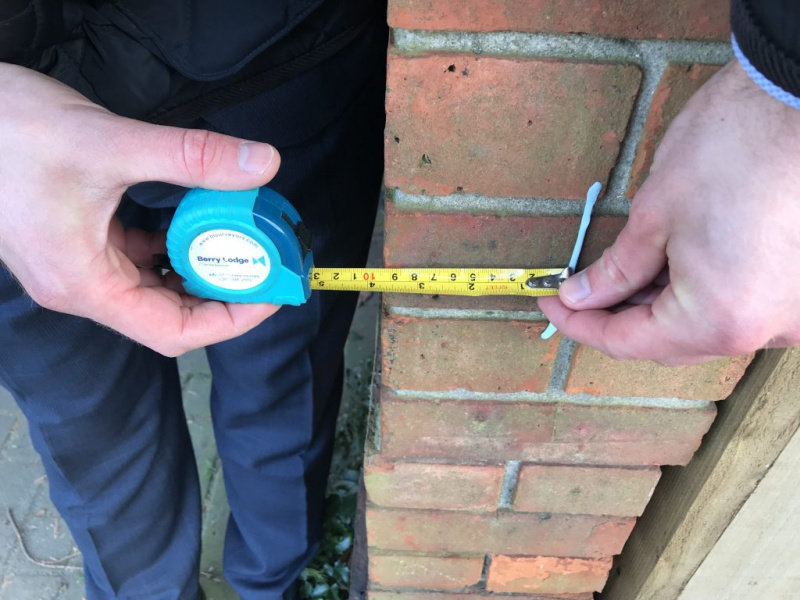File:A Boundary Dispute.jpg
Contents |
[edit] What is a Party Wall Dispute or Boundary Dispute?
Boundary or Party Wall Disputes or issues may take place when two different parties, usually property owners, disagree the location, width, ownership or maintenance liabilities of the boundary line.
Boundaries are generally set by determining features such as a fence, wall, hedge, driveway, tree, post or even a stone marker.
Over the years of the property owners and various occupants, the boundaries can often be moved, diverted, adjusted and even overgrown.
While the legal boundary line will always be indicated on the Land Registry Title Plan, often these will be to a very high scale, usually 1 to 1,250.
In practice, this means that when a Surveyor attempts to determine the boundary line using Land Registry Title Plan scale, there can be as much as a one-meter wide uncertainty as to where the true boundary line lies.
The Party Wall etc Act 1996 provides a framework to prevent and resolve the disputes with regards to the boundary walls, party walls and any type of excavation near the neighbouring buildings. According to this act, there are primarily three types of party walls.
- A wall that stands on the lands of more than one owner and forms one part of a building.
- A wall that stands on the lands of two owners without being part of any building on the land.
- A wall that is on the land of one owner; however, it is being used by two or more owners to separate their buildings.
The Party Wall etc Act 1996 was passed to prevent the party wall disputes and to protect the owners of the neighbouring premises. The Party Wall etc Act sets out an owner’s obligations and responsibilities for the work that may leave an effect on other people's property.
[edit] Reasons Behind Party Wall Disputes
A dispute may arise due to various reasons when you are being compliant with the Party Wall etc. Act. For example, you may send a written notice to the owner of the adjoining property 2-12 months before starting any type of work on the wall. In this scenario, your neighbour is supposed to provide written consent to the outlined work on the notice within 14 days. You are in dispute if your neighbour fails to do this task within the timeline.
A Party Wall Dispute may always not be acrimonious. A property owner may fail to respond to a written notice due to various reasons. Your neighbour also has the right to legally dispute notice in order to ensure that this work has no adverse effect on their interests and to avail the legal protection of an Award. Therefore, all types of party-wall disputes are not acrimonious.
[edit] Preventing Party Wall Disputes
It is not difficult to prevent these disputes before starting a project and you may use the following tips in this regard.
[edit] Discussing Plans With Neighbour
Discussing your plans with the owner of the neighbouring and adjoining property is the easiest way to resolve any party wall dispute. Alongside discussing the type of the work, it is important, to be honest about how this work may affect the property and about the measures that you are willing to take in order to mitigate this effect and/or to rectify any damage. Your neighbours may have a few concerns and/or some specific conditions that you may address during the discussion.
[edit] Identifying Property Owners
The current occupier of a property may not be its legal owner. Therefore, it is prudent to use the ‘HM LAND REGISTRY ONLINE SEARCH’ option in order to avail a ‘title register’ or ‘title summary’, as it enables you to find the legal owner of any property before sending a notice.
[edit] Clarify Your Plans
The owner of the adjoining property may dispute the notice in order to have a better understanding of your plans. An owner may even dispute in order to make sure that additional works will be performed in order to mitigate any impact of the work on their property. It is possible to avoid any dispute if you are clear about your plans from the beginning.
[edit] What to Do When a Dispute Arises?
You cannot begin any work on the party-wall until the dispute has resolved and you have received the written consent from the neighbour of the adjoining property. If you fail to reach an agreement with your neighbour or fail to persuade him/her to sign the consent form, then it is prudent to contact an independent party wall surveyor who can draw up an impartial settlement.
It is possible to appoint anyone as a party-wall surveyor if this individual is not a party to the matter. However, it is important to appoint someone who has in-depth knowledge regarding the details of Party Wall etc Act and who understands the details of the construction. Therefore, it is prudent to appoint an experienced surveyor who can help you and your neighbour reach an agreement and let you maintain cordial relations with him/her.
You and your neighbour have the liberty to appoint one surveyor (agreed surveyor) to impartially represent the interests of both parties or may appoint separate surveyors (individual surveyors) for both parties. In the second scenario, two individual surveyors work together in order to reach an impartial award that is fair to both parties. However, it may become necessary to appoint a third surveyor if individual surveyors fail to reach an agreement.
It is important to keep in mind that you must pay for the expenses, as you are supposed to do some construction work on the party-wall. A party wall surveyor is supposed to draw up a document (referred to as an ‘Award’) which includes the following details.
- Details of the construction work and when or how this work is going to be performed.
- Details of the present condition of both adjoining properties.
- Details of how to share the cost of the planned work have shared benefits for both owners.
File history
Click on a date/time to view the file as it appeared at that time.
| Date/Time | Thumbnail | Dimensions | User | Comment | |
|---|---|---|---|---|---|
| current | 13:45, 30 December 2019 |  | 1,024 × 768 (118 KB) | Berrylodge (Talk | contribs) |
- Edit this file using an external application (See the setup instructions for more information)
File usage
There are no pages that link to this file.
IHBC NewsBlog
Heritage Building Retrofit Toolkit developed by City of London and Purcell
The toolkit is designed to provide clear and actionable guidance for owners, occupiers and caretakers of historic and listed buildings.
70 countries sign Declaration de Chaillot at Buildings & Climate Global Forum
The declaration is a foundational document enabling progress towards a ‘rapid, fair, and effective transition of the buildings sector’
Bookings open for IHBC Annual School 12-15 June 2024
Theme: Place and Building Care - Finance, Policy and People in Conservation Practice
Rare Sliding Canal Bridge in the UK gets a Major Update
A moveable rail bridge over the Stainforth and Keadby Canal in the Midlands in England has been completely overhauled.
'Restoration and Renewal: Developing the strategic case' Published
The House of Commons Library has published the research briefing, outlining the different options for the Palace of Westminster.
Brum’s Broad Street skyscraper plans approved with unusual rule for residents
A report by a council officer says that the development would provide for a mix of accommodation in a ‘high quality, secure environment...
English Housing Survey 2022 to 2023
Initial findings from the English Housing Survey 2022 to 2023 have been published.
Audit Wales research report: Sustainable development?
A new report from Audit Wales examines how Welsh Councils are supporting repurposing and regeneration of vacant properties and brownfield sites.
New Guidance Launched on ‘Understanding Special Historic Interest in Listing’
Historic England (HE) has published this guidance to help people better understand special historic interest, one of the two main criteria used to decide whether a building can be listed or not.
"Conservation Professional Practice Principles" to be updated by IHBC, HTVF, CV
IHBC, HTVF, and CV look to renew this cross-sector statement on practice principles for specialists working in built and historic environment conservation roles.

















